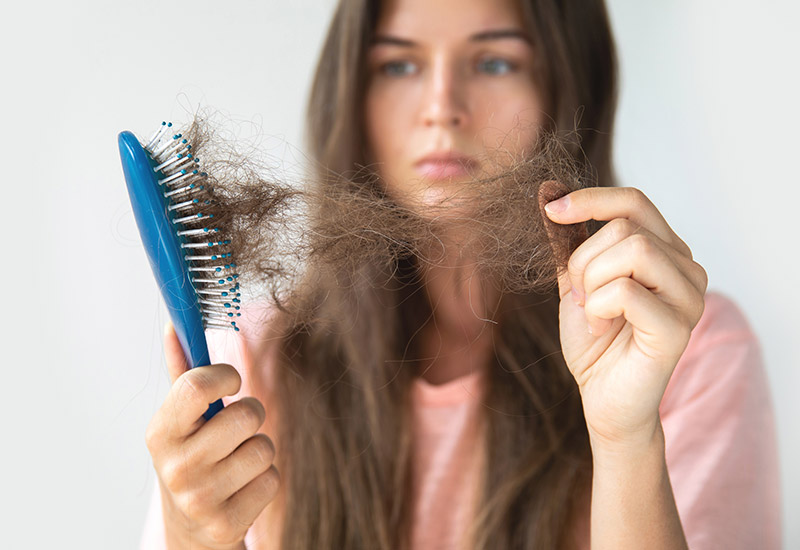Why am I losing my hair?

Hair loss can happen to anyone, regardless of gender or age. It can affect just the scalp or the entire body. It is more common in men than women, and more common in older people than young, but no matter the situation, it’s a demoralizing problem. Here are some common causes of hair loss.
- Aging is a common cause of hair loss. In fact, many people notice hair loss as they age because as we age, our hair growth slows. When hair follicles stop growing hair, the hair on the scalp begins to thin and the hairline begins to recede. During this time, hair also starts to lose color. Sometimes, people can regrow hair with treatment, if they catch it early enough, but in most cases, experts don’t recommend treating age-related hair loss. That being said, you can take steps to prevent hair breakage and keep your hair looking shiny and healthy. Avoid over-styling it, and make sure to keep it moisturized.
- Hormonal issues can cause hair loss. This is one cause of hair loss that happens at many different stages of life. Teenage hormonal shifts, stopping or starting birth control pills, pregnancy, conditions like polycystic ovary syndrome, and menopause can all result in hair loss. Additionally, conditions involving thyroid hormones, like hyperthyroidism or hypothyroidism, can also cause hair issues. Your healthcare provider can help you determine if a hormonal imbalance is the problem and treat the underlying issue.
- Hair loss can happen because of a nutritional imbalance. Deficiencies of nutrients like D, B7, zinc, iron, and biotin can cause you to lose hair, but on the other hand, it is possible to overdo it on certain vitamins. Too much vitamin A, for example, can also cause hair loss, but evening out your vitamin consumption can turn your hair loss around. Too little protein can cause you to lose your hair, but you can combat this by eating more eggs, chicken, beans, and yogurt.
- Certain illnesses can cause hair loss. Lupus is an autoimmune disease that affects the joints, skin, kidneys, heart, lungs, blood vessels, and brain. Lupus can also cause hair loss, and so can medications used to treat it. When treatment is complete, the hair loss may stop and the hair can, in some cases, grow back. Scalp psoriasis is another illness that can lead to hair loss, and scalp infections can too. With each of these illnesses, once they are resolved, the hair can regrow. Sexually transmitted infections (STIs) like syphilis, can cause hair loss if left untreated, but the hair often begins to regrow once the STI is treated.
- Taking some medications can cause you to lose hair. If you start a new medication and notice hair loss, ask your doctor if this could be a side effect. Don’t stop taking the medication without talking to your doctor, because this can cause serious health issues. However, with your doctor’s approval, you may be able to switch to a different medication that will allow the hair to grow back. Examples of medications that can cause hair loss include blood thinners, beta-blockers, methotrexate, lithium, nonsteroidal anti-inflammatory drugs (NSAIDs), and antidepressants.
- Pulling your hair can cause it to fall out. Some people unconsciously pull their hair when they’re stressed, and some people do it intentionally. Others wear hairstyles that pull the hair too severely- so severely that it pulls the hair from the roots. This causes permanent hair loss and cannot be reversed.
- Stress can cause shedding. Physical or mental stress on the body can cause an increase in cortisol, which affects the hair follicle and result in hair loss. This can happen for three months after a stressful event, but reducing stress can prevent hair loss.
- Alopecia areata is an autoimmune skin disease that causes hair loss. It affects nearly seven million people in the United States, regardless of age, sex, or ethnicity. There are different types of alopecia areata, and also various treatment options.
- Over-styling can cause hair loss. Harsh chemicals, high heat, and tight braids can all cause hair loss, and because these things affect the root, the hair might not grow back. The best thing to do is to avoid extreme hair styling and use conditioner after shampooing.
- Steroid use can result in hair loss. Anabolic steroids, the type used to bulk up muscle, can cause hair loss. Going off the steroids can sometimes allow it to regrow.
- People undergoing cancer treatment often lose their hair. Chemotherapy is a major cause of hair loss because it kills rapidly dividing cells, including cancer cells and, unfortunately, hair. Some people have success wearing cooling caps to prevent this hair loss, and once chemo is over, the hair usually regrows. Interestingly, it often comes back with a different texture or color.
- One of the many ill effects of being poisoned is hair loss. Poisons like arsenic, thallium, mercury, and lithium can result in hair loss, and so can large amounts of warfarin, which is found in rat poisons. Warfarin is also found in certain medications to prevent blood clots, strokes, and heart attacks because it is an anticoagulant. If you are taking a prescription containing warfarin, use caution and be sure to follow directions.
Just as there are many types of hair loss, there are also effective treatment methods, available through a good dermatologist. If you’re looking for a dermatologist, Swinyer-Woseth Dermatology is committed to providing superior, professional hair and skin care in a manner that’s practical, efficient, and compassionate. With over 30 years of experience providing dermatological services in Salt Lake City, we provide a variety of services, from cosmetic skincare to treatment for skin cancer. Our team of board-certified dermatologists and licensed cosmetic service providers are here to provide you with the care you need in a comfortable, professional atmosphere. Call (801) 682-4715 or contact us through our website.
